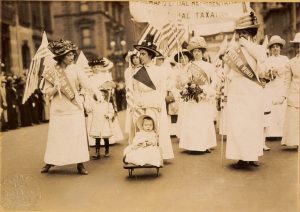The simultaneous eruption of unrest in the United States and Hong Kong in the summer of 2020 has highlighted the promise and contradiction of transnational activism. The complex relationship between the Black Lives Matter movement in the United States and the 2019-2020 Hong Kong protests has helped demonstrate how networks of transnational activists interpret and re-interpret each others’ work based on local conditions, while also making clear that some gulfs are difficult to bridge.
None of this is new; a forthcoming book by Dr. Cathleen Cahill studies the transnational pursuit of women’s suffrage through the lens of activists who spanned the from the United States to the early Chinese Republic. “Recasting the Vote: How Women of Color Transformed the Suffrage Movement” examines the work of activists in Black, Native American, and Asian communities in pursuit of the electoral franchise in the United States in the early 20th century.
Cahill highlights the figure of Mabel Ping-Hua Lee, a Chinese immigrant to the United States who travelled in suffragist circles before the passing of the 19th amendment and continued to work as an activist for Chinese-American rights for the rest of her life. Lee arrived in the United States around the turn of the century at the age of five. Tight restrictions on immigration from China had resulted in a huge gender imbalance in the Chinese-American community, with men working as laborers and women almost entirely excluded. These restrictive immigration laws made extending the franchise to Chinese-American women a moot point, as most immigrants could not even become citizens, much less voters.
The crescendo of the suffrage movement in the United States coincided with the 1911 Chinese Revolution, toppling the Qing Dynasty and establishing the Republic of China. The creation of the Republic made way for the de jure expansion of voting rights to women, although in practice the franchise was restricted by province and by locality. Nevertheless, the idea that women in the newly democratic China could vote provided a powerful impetus for suffragists in the United States. Mabel Lee personified this idea, and helped leverage the (perceived) rights of Chinese women to advocate for the extension of the franchise in the United States. She worked extensively in New York City as a high school and college student on women’s suffrage, as well as issues of more direct concern to the Chinese-American community. In 1921, a year after the ratification of the 19th amendment, Lee earned a Ph.D. in Economics from Columbia University.
But just as questions about the Trump administration have rendered relations between the Hong Kong protest movement and Black Lives Matter difficult, the suffrage movement in the United States was itself fraught with contradiction and conflict over the issue of race. Suffragists sought to create a cross-regional coalition that could fight for women’s voting rights around the country, but this effort often collided with the realities of exclusion based on race in the South and elsewhere. The idea that White women would gain the right to vote while Black men and women in the South remained disenfranchised chafed at many activists.
The stories of women’s suffrage in China and the United States are hardly models of triumph. Although the 19th amendment confirmed voting rights for American women in 1920, in practice Black women and men were excluded from voting until the 1960s (and exclusionary efforts persist to this day). In China, the Kuomintang government confirmed the national right of women to vote in 1947, shortly before the regime was chased to Taiwan. Women enjoy de jure voting rights in the People’s Republic of China, but elections themselves remain tightly restricted. The imposition of Beijing’s power over Hong Kong has undoubtedly further reduced the impact of the right of women to vote in China.

































